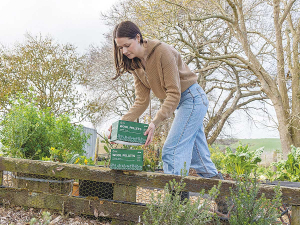Top wool advocate bales out
The conversion of productive farmland into trees has pretty much annihilated the wool industry.
 Jessica White says Cozy Crops makes the most out of their sheep and ensures that nothing they produce goes to waste.
Jessica White says Cozy Crops makes the most out of their sheep and ensures that nothing they produce goes to waste.
With wool prices steadily declining and shearing costs on the rise, a Waikato couple began looking for a solution for wool from their 80ha farm.
Kieran and Jessica White found that while they sold some of their wool, a lot of the daggy-wool and the lower quality wool wasn't getting used and would often end up in landfill.
So about six months ago the couple launched Cozy Crops, producing 100% wool pellets as fertiliser and mulch for plants.
Jessica describes Cozy Crops as "an innovative new gardening product helping Kiwis cultivate fertile, hydrated soil for healthy, productive gardens".
She says the feedback from users and retail stockists has been phenomenal. "I believe our product and story aligns well with the values of supporting NZ made natural gardening products," she told Rural News.
"As a nutritionist, knowing where my food comes from and how it's grown is so important. Our product allows anyone to cultivate fertile, hydrated gardens so they can produce more of their own food that's free from artificial fertilisers and pesticides."
Jessica says Cozy Crops was born out of the desire to make the most out of their sheep and make sure nothing they produce goes to waste.
"We also like that by putting the wool back into the ground we are keeping the nutrients and the carbon in the earth.
"The benefits of wool as a textile are well known, but little thought has been given to the low-quality wool produced in New Zealand.
"The fact of the matter is that not all sheep are producing top quality wool that can be used for clothing, but they still need to be shorn, so there is always going to be a wool by-product. Rather than letting this wool go to waste we have decided to utilise it to help Kiwis grow better, healthier crops in their own gardens."
Jessica adds that the wool pellets act as both a mulch and a fertiliser.
The wool pellets help deter slugs and snails, suppress weed growth, reduce soil water loss, and provide nutrition and structure to the soil.
She says Cozy Crops wool pellets provide a range of benefits for both plants and the environment.
"These pellets are an all-natural fertiliser with a slow-release nutrient profile, making them suitable for most plant and soil types," she says.
"The pellets also retain water, reducing the need for frequent watering and keeping soil hydrated in dry conditions, saving up to 25% in water usage. The rough texture of the wool effectively deters pests like slugs and snails, ensuring a pet-safe solution to garden pests.
"Additionally, Cozy Crops wool pellets serve as a powerful mulch, suppressing weeds and preserving soil moisture for months. As a result, they make gardening more efficient, healthier, and more productive, all while supporting New Zealand's wool industry."
Alliance is urging its farmer-shareholders to have their say on the proposed $250 million strategic investment partnership with Dawn Meats Group.
To mark International Rural Women's Day on 15 October, Women in Horticulture (WiH) and United Fresh New Zealand Inc. are sponsoring the Inspiring Wāhine Conference 2025.
Farmers are welcoming the Government’s revised science-based biogenic methane targets for 2050.
Like many manufacturers around the world, European agricultural machinery and tractor manufacturers are currently operating in a difficult market environment. But they are heading to the world’s largest agricultural machinery event in Hanover next month with a degree of cautious optimism.
Foreign Affairs Minister Winston Peters has joined the debate around the proposed sale of Fonterra’s consumer and related businesses, demanding answers from the co-operative around its milk supply deal with the buyer, Lactalis.
The ACT Party says media reports that global dairy giant Nestle has withdrawn from the Dairy Methane Action Alliance shows why New Zealand needs to rethink its approach to climate.